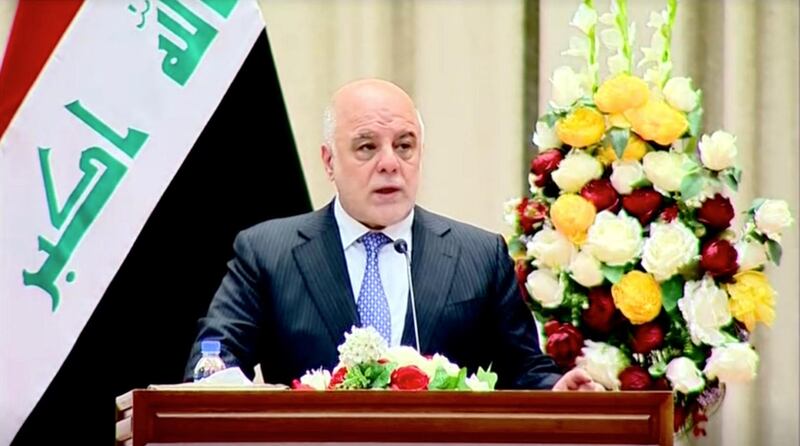Iraqi Prime Minister Haider Al Abadi touched down in Basra on Monday, after weeks of violent protests in the neglected southern province.
He met with officials in Basra who have accused Baghdad of neglecting the southern province and failing to redistribute oil wealth.
The Iraqi leader's visit came just 48 hours after he came under fire at an emergency meeting of parliament, where he faced calls to resign as his alliance with a populist Shiite cleric crumbled over the deadly unrest.
The spokesman for populist Shiite cleric Moqtada Al Sadr's list demanded the "government apologise to the people and resign immediately" while a rival alliance of pro-Iranian former paramilitary fighters said it would work with Mr Sadr to form a new government that excludes the premier.
The announcement dealt a severe blow to Mr Al Abadi's hopes of holding on to his post through a bloc, described as the biggest in parliament, unveiled just days earlier with Mr Al Sadr and more than a dozen other groups.
The embattled premier shot back on Monday from Basra by accusing unnamed "political parties who have armed wings" of having tried "to set Basra province on fire", according to state broadcaster Al-Iraqiya.
He also denounced violence against diplomatic missions. Protesters on Friday stormed Iran's fortified consulate, burning documents and equipment left behind by fleeing employees, none of whom were hurt, according to a consular spokesman.
"Attacking a consulate or diplomatic post is unacceptable," Mr Abadi was quoted as saying by Al-Iraqiya.
Oil-rich Basra and other cities in Iraq's southern Shiite heartland have been protesting since July over soaring joblessness and poor public services.
Anger in Basra flared on Tuesday over a growing health crisis, after more than 30,000 people were hospitalised by pollution in the city's water supply.
Protesters and security forces members have been killed in confrontations when demonstrators damaged and burnt government offices and attacked security forces with stones and Molotov cocktails.
Rights groups have accused security forces of using excessive force.
Officials have blamed the deaths and violence on "vandals" who infiltrated the demonstrators.
"There can be no public services without security," Mr Abadi was quoted as saying during his visit on Monday by state television.
He also vowed he would not leave Basra "before receiving guarantees" for projects that the government is trying to launch to solve the water contamination crisis.
Mr Al Abadi defended his record in an emergency parliament on Saturday, describing the unrest as "political sabotage" and saying the crisis over public services was being exploited for political ends.
His government has announced the allocation of an unspecified amount of extra funds for Basra, although demonstrators say that billions of dollars in emergency funding pledged in July has failed to materialise. Basra residents have said government corruption was one of the reasons for the protests.
Mr Al Abadi, who took office in September 2014, a few months after the ISIS onslaught in northern and western Iraq, is widely blamed for the use of excessive force against the protesters, and poor performance with public services.
_________
Read more:
Protesters set fire to government buildings in Basra - in pictures
Protesters in Basra attack offices of political parties and state-run TV channel
Protesters set Iranian consulate ablaze in Basra
Iraqi PM Haider Al Abadi faces calls to quit over deadly violence in Basra






